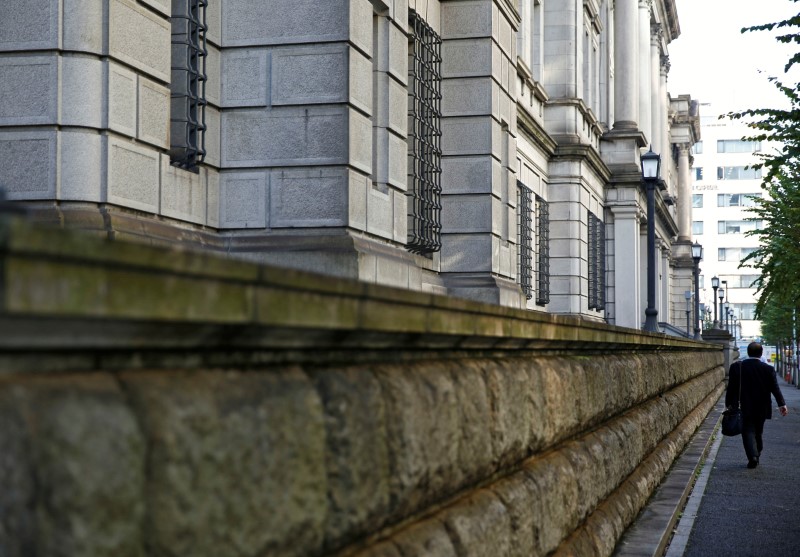By Kaori Kaneko
TOKYO (Reuters) - An increasing number of economists expect the Bank of Japan to ramp up stimulus this year, with well over a third of them polled by Reuters betting the central bank would act next week.
Japan is not alone in having to consider more stimulus, with central banks globally facing increasing pressure over the past few months to top up monetary support for their economies as the U.S.-China trade war hurts trade and business sentiment.
Sources have told Reuters BOJ policymakers are more open to discussing the possibility of expanding stimulus at their Sept. 18-19 board meeting, and are also discussing ways of deeping negative rates at minimal cost.
When asked about the BOJ's next action, 33 of 41 economists in the Sept 2-11 poll said it would loosen policy further, while eight said it would whittle down stimulus.
Among those predicting more stimulus, 13 said it would happen next week, 10 bet on October and five chose December. Two said it would happen sometime during the first half of next year.
"Risks to the global economy have risen, such as the intensifying U.S.-China trade friction," said Takumi Tsunoda, senior economist at Shinkin Central Bank Research Institute.
"The BOJ will need to show its resolve to ramp up stimulus to prevent the yen from strengthening."
The survey was taken before the European Central Bank pledged indefinite stimulus on Thursday to revive an ailing euro zone economy.
On what tools the BOJ could deploy, 22 respondents said the bank would tweak its forward guidance. Seventeen said the BOJ would widen the band at which 10-year government bonds fluctuate around its 0% target so yields can fall further.
The number of those who forecast the BOJ would deepen negative rates from the current -0.1% more than doubled to eight from just three in August.
Seven said the central bank would increase the amount of assets purchased such as exchange-traded funds (ETFs). This question allowed multiple answers.
The BOJ is under pressure to ramp up stimulus to prevent monetary support provided by its U.S. and European counterparts from triggering an unwelcome yen rise and further damaging Japan's already-weak exports.
But it is also left with little policy ammunition after years of heavy money printing. Prolonged ultra-low rates have also strained financial institutions which have lobbied heavily against a deepening of negative rates.
BOJ Governor Haruhiko Kuroda said cutting interest rates further into negative territory was among the bank's policy options, according to an interview with the Nikkei newspaper last week.
But he stressed if it were to ease, the BOJ must take into account the impact such a move could have on Japan's banking system and financial market functions.
Data last week showed the world's third-biggest economy grew at a slower pace than initially estimated in the second quarter.
Economists in the poll forecast gross domestic product will contract an annualized 2.7% in October-December due to a planned sales tax hike next month. For the current fiscal year, it is expected to expand 0.8% and slow down to 0.4% in next fiscal year from April 2020.
10-YEAR YIELD QUANDARY
The yield on 10-year Japanese government bonds (JP10YT=RR) has fallen close to a record low of -0.3% recently and well below the -0.2% level perceived by some market players as the BOJ's line in the sand.
In the face of such yield falls, the BOJ announced it would reduce the amount of five- to 10-year JGBs it planned to buy in September.
Asked how far would the BOJ allow the 10-year JGB yield to fall, 11 of 33 economists in the poll selected "minus 0.3%", nine chose "minus 0.4%", six said "minus 0.35%" and four picked "minus 0.5%".
"Considering the global economic slowdown and impacts from overseas central banks' monetary easing, the BOJ will need to expand the range of the yield fluctuation," said Harumi Taguchi, principal economist at IHS Markit.
The poll also showed Japan's core consumer price index, which includes oil products but excludes fresh food prices, would grow 0.7% this fiscal year to March 2020 and the following fiscal year.
(Polling and reporting by Kaori Kaneko; Additional polling by Anisha Sheth and Shaloo Shrivastava in BENGALURU; Editing by Leika Kihara & Shri Navaratnam)
